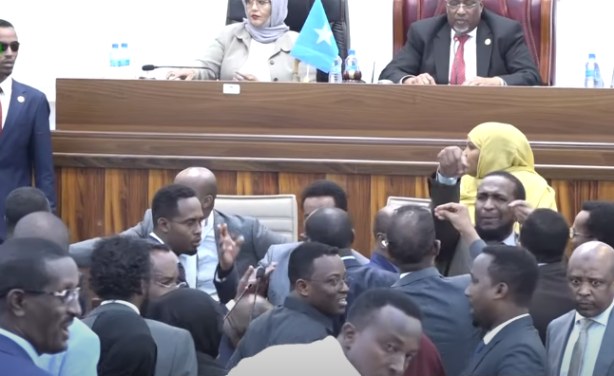Facebook Twitter (X) Instagram Somali Magazine - People's Magazine
Somalia’s federal parliament was thrown into fresh political chaos this week after Speaker Sheikh Adan Mohamed Nur suspended 20 Members of Parliament, citing security concerns following a heated confrontation inside the legislature. The unprecedented decision comes amid mounting political tensions in Mogadishu, threatening the fragile progress the country has made in recent years toward institutional stability.
The suspension was formally declared by the Speaker on Wednesday, invoking specific parliamentary procedures to bar the group of MPs from participating in any future sessions until further notice. The action followed a physical altercation within the chamber earlier this week, which was sparked by the controversial removal of MP Abdullahi Hashi Abiib. That incident, captured on internal parliamentary footage, showed verbal confrontations escalating to shoving and threats, prompting security to intervene.
Among the suspended legislators are several high-profile figures known for their vocal opposition to the current administration. Names on the list include Mohamed Deeq Barre Omar, Saadaam Mahmoud Abdi, Dahir Amin Jeesow, and Hassan Abdi Ismail. The Speaker has justified the suspensions as necessary to preserve order, restore discipline, and protect the integrity of the institution. However, critics see it as a thinly veiled attempt to consolidate power and silence dissenting voices.
Opposition MPs immediately condemned the decision, accusing the Speaker of acting unilaterally and violating democratic principles. They argue that the Speaker has exceeded his mandate by suspending elected officials without due process. According to some parliamentarians, the current environment in the House is more akin to a political battlefield than a democratic forum, where opposing views are met with intimidation and procedural maneuvering.
The suspensions have also raised alarms among civil society organizations and constitutional experts who warn that such measures set a dangerous precedent. They point to the recurring instability within Somalia’s legislative branch and caution that continued political suppression may erode the legitimacy of the government and undermine trust in state institutions.
This latest turmoil follows a string of contentious parliamentary decisions and power struggles. Earlier this year, the Speaker reinstated 15 previously barred MPs following months of protest and negotiations. That move, while welcomed by some, deepened factional divides and added fuel to the current dispute. Analysts believe the parliament is increasingly becoming a battleground for political dominance, rather than a space for dialogue and national decision-making.
The Somali public, already grappling with insecurity, economic hardship, and social discontent, now faces a deepening political crisis. The timing of the suspension is especially troubling given the ongoing debate around electoral reform and regional federalism—two issues that require broad consensus and cross-party cooperation. Instead, the rift between the Speaker and large sections of parliament may derail any meaningful progress in governance.
Observers note that the government’s failure to provide a clear roadmap out of the impasse could have long-term consequences. Without immediate efforts to rebuild trust within the legislature, Somalia risks plunging back into a cycle of institutional paralysis and political fragmentation. This could embolden non-state actors and delay crucial reforms, further weakening state authority.
As Somalia approaches pivotal decisions about its political future, transparency, accountability, and respect for democratic norms remain more important than ever. The Speaker’s recent actions may have been intended to restore order, but without due process and dialogue, they could instead deepen instability and fuel resentment.

